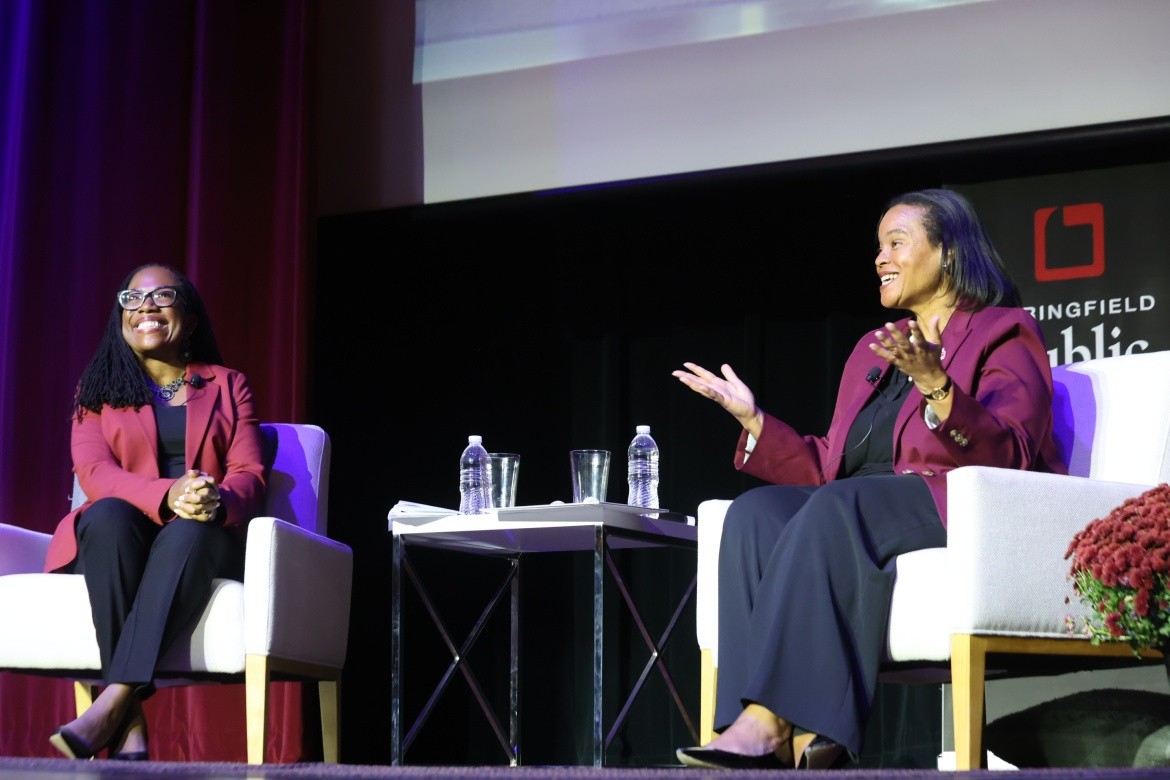Dissent as progress: reflections on Justice Jackson's talk

Lindsay Adkins, AVP for Mount Holyoke College’s Marketing and Communications team, reflects on the power of language and dissent after a public talk between President Danielle R. Holley and Supreme Court Justice Ketanji Brown Jackson.
We were so breathless at the thought of hearing Ketanji Brown Jackson speak that one of us left the tickets in the car. We’d been told the tickets were important — it was a completely sold-out event with a pages-long waiting list. So we rushed to the car, grabbed the tickets and dashed back to Springfield Symphony Hall.
Mount Holyoke President Danielle R. Holley would be in discussion with the Supreme Court associate justice. We were there to represent the College’s Marketing and Communications Office and to cover the event. Naturally, we were elated. This was a true “Do we really get to do this for a living?” moment.
There is no shortage of things to admire about Justice Jackson. As professional communicators, we went into the event with a reverence for, among other things, her ability to shape language to purpose — both when she writes and when she speaks. But we did not expect that the story we’d want to tell afterward would be about the power of telling stories.
She began by reading a passage from the preface of her memoir, “Lovely One,” that candidly described how she had felt during her swearing-in ceremony. “I had to keep reminding myself this moment was real,” she wrote.
So much had led up to that critical moment — Justice Jackson’s own story as a daughter of parents who had come of age during the civil rights movement and had attended historically black colleges and universities (HBCUs) in the Jim Crow South, and who was now taking an oath on her family Bible that made her the first Black woman to serve on the United States Supreme Court.
This story gave so many people across the country hope, inspired them and spoke to their own histories. After being nominated by then-President Joe Biden, Justice Jackson received numerous invitations to speak. People wanted to meet her and hear her story, one that had almost immediately become a point of connection.
That is what stories do. Every day in the Marketing and Communications Office, the seed from which our work springs is a relatively simple question: “How can we tell this story so that others will connect and engage with it?” Of course, answering this question is often not simple. And hearing Justice Jackson speak openly about her experiences affirmed that truth and heart are key.
So is context. Justice Jackson described growing up with an awareness of her history and ancestors. Deeply proud of their heritage, her parents instilled in her a sense of possibility. Post–Jim Crow, her mother felt strongly that her daughter would do all the things she hadn’t been able to do and have all the opportunities she hadn’t been given.
The stories of the past served as the backbone of Justice Jackson’s present and future. During the event, President Holley praised her demeanor during her notoriously intense confirmation hearing by saying, “You were carrying the pride of every ancestor.”
Justice Jackson was also specific and intentional with the stories she told herself early on and with the words she used to define her dreams. In her high school yearbook, she wrote that she wanted a federal judicial appointment. She was a member of the speech and debate team, and she wrote in her application to Harvard University that she wanted to be the first Black woman to serve on the Supreme Court and perform on Broadway — two seemingly incongruous aspirations.
But speech and debate gave her “the comfort of public speech and expression,” she said. This skill is essential both in the courtroom and on the stage, which are venues that demand the ability to communicate powerfully and listen intently. (And she did perform for one night only in the musical “& Juliet” on Broadway.)
Because of the current political landscape, much of Justice Jackson’s role on the Supreme Court involves penning dissenting opinions. During the event, she talked at length about the importance of dissent. She said that it embodies our American value of freedom of expression and that tolerance of minority views is woven into the fabric of who we are. She said she had learned from the late Justice Ruth Bader Ginsburg that writing dissents is for history, not just the present — a reminder that our words can sometimes outlive us.
That belief in dissent as progress, as a way to shape who we become and how we’re remembered, also defines Mount Holyoke. It echoes College founder Mary Lyon’s vision and continues through the voices and actions of our students, alums, faculty and staff. Many of the stories we tell now will be remembered, in the same way we carry with us the stories from decades ago.
During their conversation, President Holley asked Justice Jackson how she’d like to be remembered. She said, “I would love to be known as a hard worker and a good communicator, someone who could reach people and inspire them — someone who did what she could.”
Something tells us that she will achieve this goal, too. It is a worthy goal for all of us to strive for.
